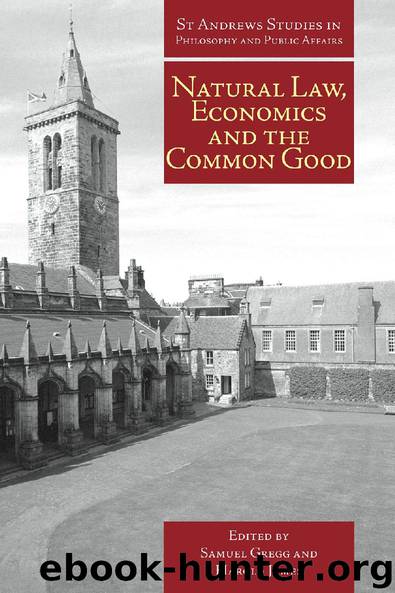Natural Law, Economics and the Common Good by Samuel Gregg & Harold James

Author:Samuel Gregg & Harold James
Language: eng
Format: epub
Tags: natural law, economics, common good, financial crisis, debt, banking, economy, economic, ethics, regulation, reform, philosophy, Keynes, globalization, global, political economy, finance, morality, international affairs, boom, bust, recession, downturn, Adam Smith, global economy, property rights, avarice, money, monetary, society, financial crisis, crash, depression, fiscal policy, public finances
ISBN: 9781845403904
Publisher: Andrews UK Limited 2012
Published: 2012-03-08T00:00:00+00:00
Neither the court in Eldred nor its dissenters or critics made use of natural law or natural rights in relation to the issue, at least explicitly. Lessig makes a powerful argument in his book Free Culture that the current regime locks in place the dominant forces of contemporary popular culture and thus inhibits genuine cultural development, although his reasoning is largely utilitarian: most cultural creation throughout history has depended to a certain extent upon the borrowing and reworking of existing cultural artefacts. He nicely shows that even Walt Disney’s iconic Mickey Mouse, who remains copyrighted with every extension, was introduced in the 1928 synchronized-sound cartoon film Steamboat Willie, which was a parody of a silent Buster Keaton film of the same year called Steamboat Bill, Jr. He argues that the increasingly intolerant law of copyright now punishes creative efforts that similarly employ emergent technologies to alter or transform cultural products, for instance by restricting the use of film clips even in documentaries and in work created from content available through the internet. Moreover, having discarded copyright registration and renewal while exposing artists to severe liability for copyright infringement, US law inhibits even efforts to copy and preserve decaying film and material from the era between 1923 and the invention of digital media, for it places the burden on would-be preservers to find the owners of old copyrights to material long since removed from public circulation and no longer available commercially - as is indeed the case with the vast majority of copyrighted material.
As for the digital age, if the problem of preservation is apparently solved, new problems of access are multiplying: a traditional book can remain on a library shelf for years and be read by multiple users without further fees to its author or its publisher - or it can be bought once and then resold without a further licence - but every use of an electronic database comes with the potential of a licence fee, and every access through the internet involves making some sort of electronic copy. Lessig argues for a limiting of copyright terms, a restoration of registration and renewal, a lessening of penalties for unauthorized use in areas where technology is emerging and the distinction between piracy and property is not yet settled, and the development of a ‘Creative Commons’ of freely licensed cultural products. [69] He recognizes, though, that there are powerful interests behind the current system and that the beneficiaries are not only the large corporations he condemns but successful artists, whose creative energies he does not want to deflate.
In light of this ongoing legal tussle, what can considerations of natural law bring to analysis of intellectual property rights? First, a sort of natural-right claim on the part of writers and artists seems to stand behind the intuition that supports copyright protection - and indeed supports its global claim, for true artistic achievement is universally recognized as a contribution to the heritage of humankind. This hardly makes the claim perpetual; it would seem
Download
This site does not store any files on its server. We only index and link to content provided by other sites. Please contact the content providers to delete copyright contents if any and email us, we'll remove relevant links or contents immediately.
The Deficit Myth by Stephanie Kelton(1107)
Reimagining Capitalism in a World on Fire by Rebecca Henderson(920)
What the Dog Saw: And Other Adventures by Malcolm Gladwell(908)
Karl Polanyi by Gareth Dale(872)
The Logic of Life by Tim Harford(802)
The Capital by Karl Marx(791)
The Essential Adam Smith by Smith Adam(713)
Freakonomics: A Rogue Economist Explores the Hidden Side of Everything by Levitt Steven D(645)
One Flew Over the Cuckoo's Nest by Ken Kesey(635)
An Essay on the Principle of Population by T. R. Malthus(596)
The Mythology of Work by Peter Fleming(593)
The Outline of Sanity by G. K. Chesterton(574)
Freakonomics: A Rogue Economist Explores the Hidden Side of Everything by Steven D. Levitt; Stephen J. Dubner(556)
The Worldly Philosophers by Robert L. Heilbroner(527)
The Marginal Revolutionaries by Janek Wasserman(523)
The Idea of Justice by Amartya Sen(510)
On the Principles of Political Economy and Taxation (Economics books Book 11) by Ricardo David(508)
The AI Economy by Roger Bootle(478)
Free to Choose by Friedman Milton & Friedman Rose(474)
